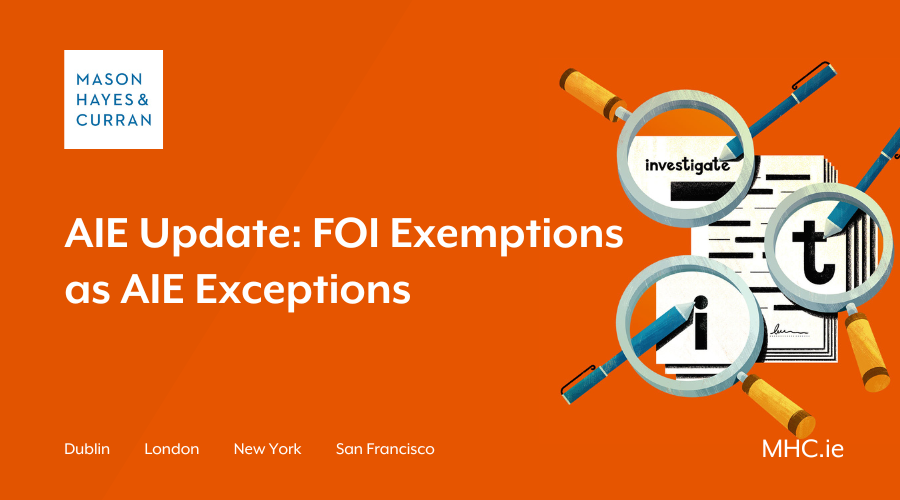
A recent High Court decision clarifies that exemptions under the Freedom of Information Act which protect the confidentiality of the proceedings of public authorities can be invoked by FOI bodies deciding on a request under the Access to Information on the Environment Regulations if they would apply in the context of an FOI request. The decision also clarifies, however, that public authorities who come within the AIE Regulations, but who are not also FOI bodies under the FOI Act, cannot invoke such FOI exemptions in the AIE context.
Our Public, Regulatory & Investigations team reviews the potential implications for certain public authorities.
The interpretation of Article 8(a)(iv) of the Access to Information on the Environment (AIE) Regulations was recently considered by the High Court in Commissioner for Environmental Information v Coillte Teoranta and People over Wind[1]
Article 8(a)(iv) requires a public authority to refuse a request for environmental information “if disclosure of the information would adversely affect the confidentiality of the proceedings of public authorities, where such confidentiality is otherwise protected by law (including the [FOI Act], with respect to exempt records within the meaning of those Acts)”.
We outline the Court’s judgment and its implications below.
This case concerned the first-ever referral by the Commissioner for Environmental Information of questions of law to the High Court under Article 12(9)(a) of the AIE Regulations, and the postponement of his decision-making pending determination of the questions.
The Commissioner sought clarification on an issue under Article 8(a)(iv) of the AIE Regulations that arose both in the particular appeal before him involving 'People Over Wind' and Coillte, and also in many other appeals against decisions of public authorities under the AIE Regulations that have been awaiting the outcome of these proceedings.
That issue was essentially whether, for the purposes of Article 8(a)(iv),
- The FOI Act represented a law which provided for the “confidentiality of public authorities”, and
- Even if that was so, a “public authority” under the AIE Regulations that was not also an FOI body under the FOI Act could rely on the FOI Act exemptions to resist disclosure of environmental information under the AIE Regulations.
The Court answered these questions ‘yes’, and ‘no’, respectively.
In a helpful and succinct summary, Ms Justice Hyland set out the Commissioner’s questions (as reformulated by the Court), together with the answers, as follows:
“Question A: Do the exemptions in the FOI Act create protection for the confidentiality of proceedings of public bodies such that the FOI Act provides for legal protection of confidentiality for the purposes of Regulation 8(a)(iv) of the AIE Regulations?
Answer: The exemptions in the FOI Act create protection for the confidentiality of proceedings of public bodies where records sought to be disclosed are found to be exempt within the meaning of the FOI Act, such that the FOI Act protects the confidentiality of the proceedings of public authorities for the purposes of Regulation 8(a)(iv) of the AIE Regulations, (public authorities being defined in those Regulations).
Question C(1) and (2): Having regard to the response to Question A, is the confidentiality protection under the FOI Act identified in Regulation 8(a)(iv) available to Coillte, given its status as an exempt agency under the FOI Act?
Answer: The FOI Act only protects the confidentiality of proceedings of public bodies where records sought to be disclosed are found to be exempt within the meaning of the FOI Act. Records are only exempt where the public body seeking to withhold access is a body subject to the FOI Act, as defined by section 6 of the FOI Act, and where (if applicable), both limbs of the test for exemption are met: the records come within an exemption protecting the confidentiality of proceedings of public bodies and the public interest does not warrant disclosure. As Coillte is an ‘exempt agency' under the Act, the confidentiality protection under the FOI Act identified in Regulation 8(a)(iv) is not available to Coillte”.
Comment
It is now clear that a public authority that is also an FOI body under the FOI Act may refuse to disclose environmental information sought under the AIE Regulations where the same information, if sought under the FOI Act, would be withheld on the basis that an exemption providing for the confidentiality of the proceedings of the body would apply. Examples would include section 29 or 30 of the FOI Act.
This means that in the case of bodies that are both public authorities and FOI bodies, Article 8(a)(iv) of the AIE Regulations in effect ‘imports’ exemptions available from the FOI scheme, provided such exemptions serve to protect the confidentiality of the proceedings of such bodies.
Exempt agencies
A legislative anomaly seems to arise regarding agencies that are currently specifically exempted from the FOI Act’s application. These “exempt agencies” are bodies that would otherwise be subject to the FOI Act, but legislative policy is to insulate them completely from having to disclose information under FOI, rather than only in certain defined cases. The intention behind their express exemption from FOI would appear to have been to give them the most extensive protection, including to the confidentiality of their proceedings. The Court’s ruling states that agencies not subject to the FOI Act, including exempt agencies under that Act, cannot invoke FOI Act exemptions via Article 8(a)(iv) of the AIE Regulations in the AIE context. Therefore, such agencies have fewer grounds for exemption available under AIE than similar agencies that are subject to FOI. Agencies that are subject to both schemes, but are dealing with a request under the AIE Regulations can invoke exemptions designed to apply in the case of an FOI request being made (which would not be the case).
Note, however, that any other legal principle or legislative provision protecting the confidentiality of the proceedings of an agency, including an exempt agency (for example, in its establishing legislation) would be capable of being invoked by any agency in the AIE context via Article 8(a)(iv).
Conclusion
The judgment of Ms Justice Hyland provides welcome clarification of the meaning and scope of the exception from disclosure provided for in Article 8(a)(iv) of the AIE Regulations, when it comes to whether and what FOI exemptions might be invoked, and by whom.
This had been uncertain for some time.
In practical terms, a public authority that is also an FOI body dealing with an AIE request can:
- Consider whether the record(s) containing the environmental information sought would be refused under the FOI Act under any relevant confidentiality-of-proceedings-type exemption;
- Apply any applicable public interest test that might override such exemption; and
- Come to a view on whether the exemption would apply under FOI.
If the body considers the FOI exemption would apply, it can then invoke Article 8(a)(iv) of the AIE Regulations on that basis.
For more information on the interpretation of the above principles or on the case itself, please contact a member of our Public, Regulatory & Investigations team.
The content of this article is provided for information purposes only and does not constitute legal or other advice.
[1] [2023] IEHC 227
Share this:






